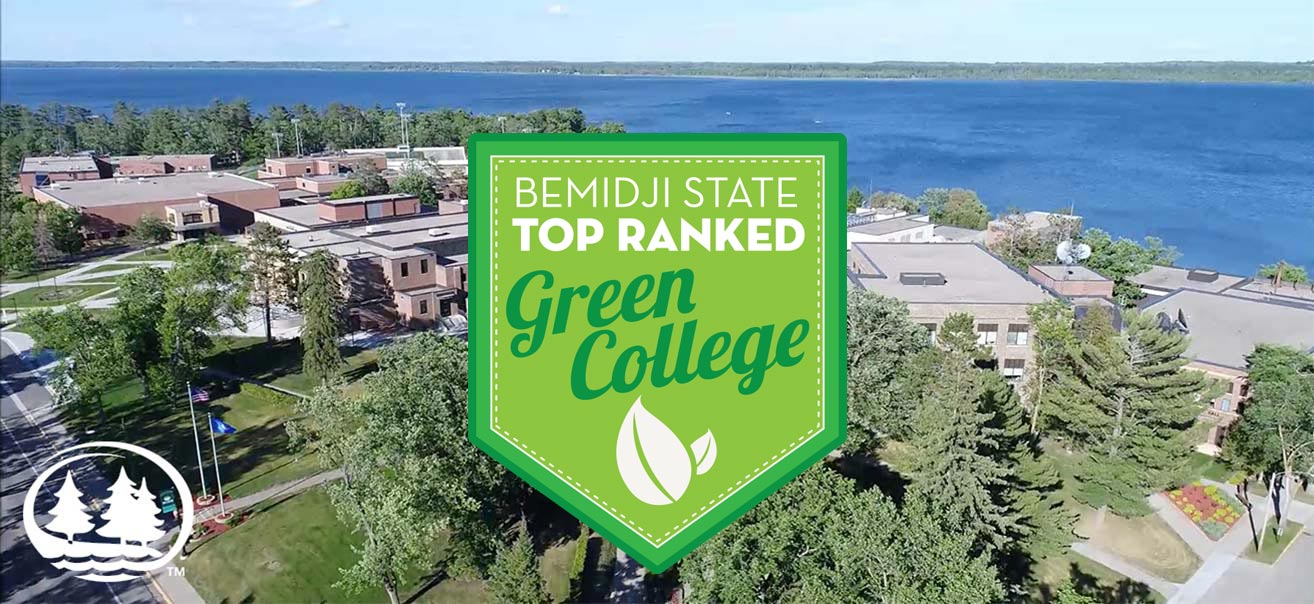
Bemidji State University has been listed amongst the top 375 most environmentally responsible colleges in the country by The Princeton Review.
The Princeton Review’s eighth annual Guide to 375 Green Colleges profiles institutions with exceptional commitments to sustainability based on their academic offerings and career preparation for students, campus policies, initiatives and activities.
The Princeton Review’s Green College rating provides a comprehensive measure of a school’s performance as an environmentally aware and prepared institution. It measures:
- whether students have a campus quality of life that is both healthy and sustainable,
- how well a school is preparing students for employment in the clean-energy economy of the 21st century as well as for citizenship in a world now defined by environmental concerns and opportunities and
- how environmentally responsible a school’s policies are.
 “This helps justify our work,” said Erika Bailey-Johnson, BSU’s director of sustainability. “Not every campus has a sustainability office, but 10 years ago our administration and our students decided this is the direction they wanted to go. To be recognized in this way validates everything that BSU took a risk on 10 years ago. This is something BSU wants to be known for, and this recognition helps us feel good about our work.”
“This helps justify our work,” said Erika Bailey-Johnson, BSU’s director of sustainability. “Not every campus has a sustainability office, but 10 years ago our administration and our students decided this is the direction they wanted to go. To be recognized in this way validates everything that BSU took a risk on 10 years ago. This is something BSU wants to be known for, and this recognition helps us feel good about our work.”
The Guide to 375 Green Colleges’ online resources include detailed “Green Facts” write-ups on many schools, reporting on a variety of subjects including a school’s use of renewable energy, recycling and conservation programs to the availability of environmental studies and career guidance for green jobs.
The Princeton Review has been publishing its Guide to Green Colleges since 2011. Bemidji State University was previously listed in both 2011 and 2012.
With its unique lakeside location in Minnesota’s north woods, Bemidji State University has long been a champion of environmental stewardship which, along with civic engagement and leadership, international and multicultural understanding and a belief in the power of the liberal arts, stands as one of its core fundamental values.
BSU is home to one of the nation’s oldest environmental studies programs. Students gain skills required to tackle important climate change-related problems, including specializations in ecosystems studies, environmental policy and planning, environmental toxicology, environmental management and geohydrology. All BSU students are required to take a course called People and the Environment, which teaches them not only about complex ecosystems but also about the social systems needed to address complex global problems. The course includes a service-learning component which gives students an opportunity to interact with the Bemidji community.
Notable sustainability awards and initiatives at BSU include:
- In May 2017, Bemidji State was one of nine post-secondary institutions nationwide to be honored with a 2017 U.S. Department of Education Green Ribbon Schools Postsecondary Sustainability award.
- BSU has employed a full-time sustainability officer since 2008.
- Students pay a voluntary “green fee” of $7.50 per semester, which helps fund environmental stewardship, awareness and education activities.
- In 2008, BSU signed the American College and University President’s Climate Commitment and surpassed its interim carbon reduction goal of 2 percent by 2015, reducing emissions by 3 percent from a 2010 baseline. BSU reaffirmed its commitment when President Faith C. Hensrud signed the Second Nature Carbon Commitment in April 2017.
- In the last two years, BSU has constructed one LEED-certified building — the newly renovated Memorial Hall, which in 2016 was a finalist for a sustainability award in the State of Minnesota’s Buildings, Benchmarks, and Beyond (B3) competition— and one ENERGY STAR-certified building.
- BSU’s Donate, Don’t Dumpster program encourages students to donate gently used items to a FreeStore. Since it opened in 2010, the FreeStore has kept more than 10,000 items out of landfills.
- Since 2006, BSU has doubled campus recycling and reduced waste production by 30 percent.
- BSU’s sustainability efforts include a significant focus on the wellness of students, faculty and staff. The university launched a broad-reaching student wellness initiative called The Best You @ BSU, and an active Living Well, Working Well committee provides programming and support for faculty and staff.
How Schools Were Chosen for the Guide
Colleges were chosen for the Guide to 375 Green Colleges based on “Green Rating” scores tallied by The Princeton Review from 629 responses to the organization’s 2016-17 survey of school administrators. In the survey, schools were asked to report on 25 data points related to sustainability-related policies, practices and programs. The 375 schools with an overall Green Rating of 80 or higher were named Green Colleges and included on the final list.
Contact
- Erika Bailey-Johnson, BSU sustainability director; (218) 755-2560, ebaileyjohnson@bemidjistate.edu
Links
- BSU Sustainability Office
- The Princeton Review’s Guide to 375 Green Colleges, 2017
- The Princeton Review’s Green Rating: Methodology
 Bemidji State University, located amid the lakes and forests of northern Minnesota, occupies a wooded campus along the shore of Lake Bemidji. Enrolling more than 5,100 students, Bemidji State offers more than 80 undergraduate majors and eight graduate degrees encompassing arts, sciences and select professional programs. BSU is a member of the Minnesota State system of colleges and universities and has a faculty and staff of more than 550. The university’s Shared Fundamental Values include environmental stewardship, civic engagement and international and multicultural understanding.
Bemidji State University, located amid the lakes and forests of northern Minnesota, occupies a wooded campus along the shore of Lake Bemidji. Enrolling more than 5,100 students, Bemidji State offers more than 80 undergraduate majors and eight graduate degrees encompassing arts, sciences and select professional programs. BSU is a member of the Minnesota State system of colleges and universities and has a faculty and staff of more than 550. The university’s Shared Fundamental Values include environmental stewardship, civic engagement and international and multicultural understanding.
2017-B-S-005
